MercoPress. South Atlantic News Agency
Tag: Hugo Chávez
-
Wednesday, April 17th 2013 - 23:06 UTC
After the megalomaniac years of Chavez Venezuela is ready for a sober Maduro

By R. Viswanathan (*) - The election of Nicolas Maduro, the chosen heir of Chavez, in last Sunday’s election, is good news for the peaceful and orderly transition of Venezuela after the abnormal, autocratic and quixotic rule of Chavez in the last fourteen years. If Capriles had won, the change would have been abrupt and traumatic for the Chavistas who might not have given up power so easily without some messy fight.
-
Thursday, April 11th 2013 - 18:25 UTC
Maradona joins the Venezuelan campaign in support of Chavism and Maduro
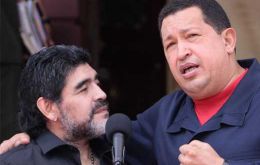
Venezuelan incumbent presidential candidate Nicolas Maduro’s closing campaign rally will have a special guest on Thursday with football legend Argentine Diego Maradona giving a celebrity boost to the colourful presidential elections that will test Hugo Chavez’s populist legacy.
-
Thursday, March 21st 2013 - 06:36 UTC
Capriles says that with the devaluations Maduro is destroying the 14 years of Chavez achievement
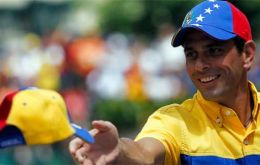
Venezuelan opposition candidate Henrique Capriles claimed that acting president Nicolas Maduro with his latest decision approving a new devaluation of the local currency Bolivar is destroying the country, and he is achieving it in the hundred days he has been running the government.
-
Wednesday, March 20th 2013 - 07:46 UTC
Venezuelan presidential candidate Capriles pledges “not another drop of oil to Cuba”
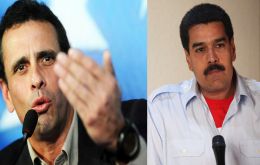
Venezuelan opposition presidential candidate on Monday vowed to end the OPEC nation's shipments of subsidized oil to the Castro brothers regime in Cuba, slamming acting President as a puppet of Havana.
-
Saturday, March 16th 2013 - 07:41 UTC
Millions turned out in Caracas for the final farewell to Hugo Chavez

Hundreds of thousands of Venezuelans took to the streets of Caracas on Friday to bid a final farewell to late president Hugo Chavez a month before elections to pick his successor.
-
Tuesday, March 12th 2013 - 00:12 UTC
”Absolute confidence” of the Cuban regime in Nicolas Maduro
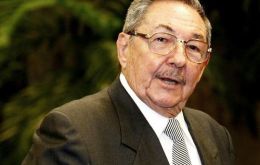
President Raul Castro expressed “absolute confidence” in Hugo Chavez's successors, after returning from the populist leader's funeral in Caracas, the Cuban press reported Sunday.
-
Tuesday, March 12th 2013 - 00:04 UTC
Chavez, the best friend of the Cuban people in their history, says Fidel Castro
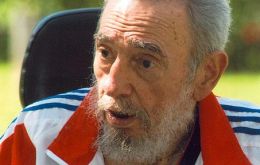
Cuba's Fidel Castro praised the late Venezuelan President Hugo Chavez as a champion of the poor and said Cubans had lost their best friend ever, in his first comments on the death last week of his socialist ally. Castro said the news, although not unexpected, had been a hard blow.
-
Monday, March 11th 2013 - 22:59 UTC
“Chavism” (like Argentina’s Peronism) for a long time to come, forecasts Mujica
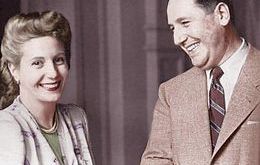
Uruguayan president Jose Mujica compared the future of Chavism in Venezuela with that of the Argentine Justicialista Party, which had in Juan Domingo Peron and his wife Evita Peron their maximum leaders (and caudillos), and even today in the almost hegemonic political movement in Argentina.
-
Monday, March 11th 2013 - 05:37 UTC
Brazil pledges support for Venezuelan transition but takes distance from Chavez populism
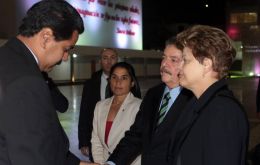
By leaving Venezuela before Friday’s funeral ceremony for leader Hugo Chávez, Brazilian President Dilma Rousseff was once again trying to chart out a more moderate signal to investors and diplomats, plus probably avoiding Iranian president Mahmoud Ahmadinejad, whom contrary to her predecessor Lula da Silva, she has strongly criticized.
-
Sunday, March 10th 2013 - 01:52 UTC
Venezuela announces snap presidential election for April 14
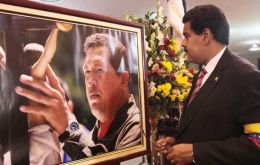
Venezuela announced Saturday that it will hold a presidential election to succeed late leader Hugo Chavez on April 14 after his political heir took office. The national electoral council set the date one day after Nicolas Maduro, Chavez's handpicked successor, was sworn in as acting president in a ceremony largely boycotted by the opposition, which slammed it as unconstitutional.
